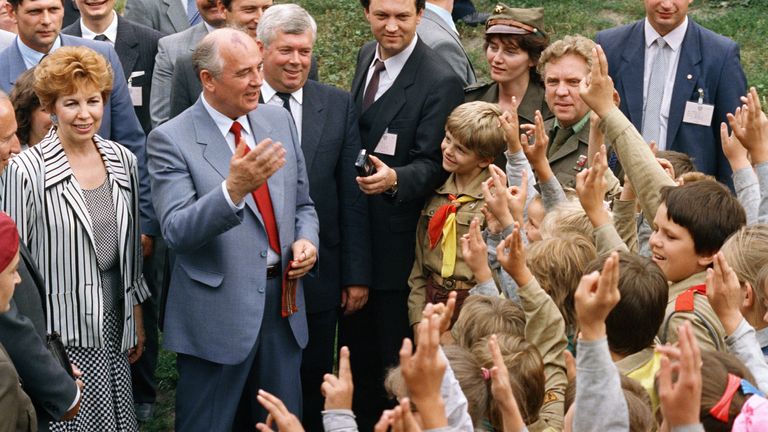The village boy Gorbachev, whose democratic instinct and abhorrence of nuclear weapons changed the 20th century
Mikhail Gorbachev was a village boy of Russian-Ukrainian heritage who changed the course of 20th century history. A man whose deeply held convictions as to the perils of nuclear war re-defined the Soviet Union’s relations with the West, and whose democratic instinct led to freedom for hundreds of millions of people as the Iron Curtain came tumbling down.
He came to power in 1985 when the USSR was seen as the evil empire, locked in a nuclear arms race with the United States.During his six years in power he would oversee the end of the Cold War but also the collapse of his own country, the Soviet Union, ripped apart by the socio-economic strains his reformist policies unleashed.His passing comes at a time when the open, democratic values he espoused have been stripped from Russian political life and his life’s work on nuclear disarmament almost wholly undone.
After the death of Konstantin Chernenko in 1985, Gorbachev was seen as a new kind of Soviet leader.
Image:
Mikhail Gorbachev speaking at Victory Day celebrations in May 1985, shortly after he was appointed President of the Soviet Union. Pic:AP
Young and vigorous compared with his aged predecessors, he had an easy charm, engaging with the people, wading through crowds with a smile and an attentive ear, all strategically broadcast via state television to present this new leader as a breath of fresh air in what had become a stale socialist superpower.But the economy Gorbachev inherited was failing. He knew the Soviet Union could no longer afford the Cold War or its enormous defence budget and set about courting world leaders, trying to convince them that the USSR was no longer a threat.
Image:
Mikhail Gorbachev chats to Polish scouts as he strolls through the old city of Warsaw on a visit in 1988. Pic: AP
In the White House he found a president who was just as interested in reducing nuclear weapons.
Advertisement
Two years into his leadership, Gorbachev signed the Intermediate Nuclear Forces Treaty with Ronald Reagan, eliminating an entire class of nuclear weapons and curbing the nuclear arms race.
Image:
Ronald Reagan (R) and Mikhail Gorbachev sign the Intermediate-Range Nuclear Forces (INF) treaty in 1987
Image:
Former President Ronald Reagan (R) drives former Soviet President Mikhail Gorbachev (L) in a jeep at the Reagan’s ranch
PIC:AP
Four years later came another signature deal, the Strategic Arms Reduction Treaty (START) signed together with George HW Bush, which further cut the superpowers’ nuclear arsenals.His abhorrence for nuclear weapons stemmed in part from the Chernobyl nuclear disaster. It took Gorbachev sixteen days to go public with what had happened but it was a turning point for him, revealing the awful consequences of nuclear power.
Image:
Soviet President Mikhail Gorbachev with US President George Bush during a summit
He was determined that the failings Chernobyl uncovered would only accelerate the pace of his reforms.Those were perestroika (re-structuring) and glasnost (openness) – attempts to reinvigorate the stagnant Soviet economy and shed the more totalitarian aspects of Soviet life by allowing for at least some freedom of expression.Rock-bands previously underground began to perform on stage. Viktor Tsoi’s “Peremen!” summed-up the mood of the time. “Our hearts demand change,” the chorus went and the people felt it too.In 1989, Gorbachev withdrew the last Soviet troops from Afghanistan after a disastrous 10-year campaign.
Image:
Weary-looking Soviet soldiers ride out of Kabul on their way home to the Soviet Union in May 1988. Pic: AP
As the Berlin Wall came down that same year, he refused to intervene even as the communist regimes of Eastern Europe collapsed.Read more: How the Berlin Wall split Europe until it came down in 1990He was awarded the Nobel Peace Prize the following year.But within the Soviet Union, Gorbachev’s popularity was plummeting.
Image:
Mikhail Gorbachev receives applause from the audience in Oslo as he enters to deliver a Nobel lecture in 1991, a year after winning the Peace Prize. Pic: AP
Economically, perestroika was not working.Gorbachev’s vision was to reform the Soviet Union, but nationalist impulses driven by glasnost were gathering pace across the Soviet republics and in Moscow, Gorbachev was having to tread a delicate balance between the communist old guard and radical reformers who felt he wasn’t doing enough.In August 1991, tanks rolled into Red Square as conservative hardliners attempted a coup d’etat.Gorbachev, holidaying in Crimea, was put under house arrest. But the people pushed back under the leadership of Gorbachev’s political rival, Boris Yeltsin, who rallied the crowds outside the presidential palace.Unarmed civilians faced down tanks.Six years of increasing freedoms under Gorbachev had given them courage and something worth fighting for.
Image:
People climb aboard a Soviet armoured personnel carrier and try to block its advance near Red Square in Moscow, after a group of top Communist officials attempted to oust Gorbachev in August 1991. Pic: AP
After three days the coup collapsed and Gorbachev returned with his family to Moscow.But the balance of power had shifted from him.In November, Yeltsin who was president of the republic of Russia, banned the communist party and one month later, together with his Belarusian and Ukrainian counterparts, he declared a commonwealth of independent states, effectively rendering the USSR obsolete.
Image:
Mikhail Gorbachev signs the decree relinquishing control of nuclear weapons to Boris Yeltsin on Christmas Day 1991. Pic: AP
On Christmas Day 1991, Gorbachev had no choice but to resign and the Soviet Union was no more.By his side throughout was Raisa, the love of his life and his closest counsel.The couple met at university in Moscow and were married for 46 years. She died of leukemia in 1999.”When she died my life was taken away from me,” Gorbachev said.
Image:
US President Ronald Reagan (left), first lady Nancy Reagan (2nd left), Mikhail Gorbachev, right, and his wife Raisa Gorbachev (2nd right) in December 1987. Pic: AP
Celebrated abroad, his legacy at home was conflicted – many blaming him for failing to follow through on his economic reforms and for the chaos and widespread poverty which Russians endured after the Soviet Union’s collapse.But he remained a moral voice in Russia, continuing his work through his own fund for Socio-Political Research, better known as the Gorbachev Foundation, and Green Cross International, a Geneva-based environmental organisation.

Mikhail Gorbachev was a village boy of Russian-Ukrainian heritage who changed the course of 20th century history.
A man whose deeply held convictions as to the perils of nuclear war re-defined the Soviet Union’s relations with the West, and whose democratic instinct led to freedom for hundreds of millions of people as the Iron Curtain came tumbling down.
He came to power in 1985 when the USSR was seen as the evil empire, locked in a nuclear arms race with the United States.
During his six years in power he would oversee the end of the Cold War but also the collapse of his own country, the Soviet Union, ripped apart by the socio-economic strains his reformist policies unleashed.
His passing comes at a time when the open, democratic values he espoused have been stripped from Russian political life and his life’s work on nuclear disarmament almost wholly undone.
After the death of Konstantin Chernenko in 1985, Gorbachev was seen as a new kind of Soviet leader.
Young and vigorous compared with his aged predecessors, he had an easy charm, engaging with the people, wading through crowds with a smile and an attentive ear, all strategically broadcast via state television to present this new leader as a breath of fresh air in what had become a stale socialist superpower.
But the economy Gorbachev inherited was failing. He knew the Soviet Union could no longer afford the Cold War or its enormous defence budget and set about courting world leaders, trying to convince them that the USSR was no longer a threat.
In the White House he found a president who was just as interested in reducing nuclear weapons.
Two years into his leadership, Gorbachev signed the Intermediate Nuclear Forces Treaty with Ronald Reagan, eliminating an entire class of nuclear weapons and curbing the nuclear arms race.
Four years later came another signature deal, the Strategic Arms Reduction Treaty (START) signed together with George HW Bush, which further cut the superpowers’ nuclear arsenals.
His abhorrence for nuclear weapons stemmed in part from the Chernobyl nuclear disaster. It took Gorbachev sixteen days to go public with what had happened but it was a turning point for him, revealing the awful consequences of nuclear power.
He was determined that the failings Chernobyl uncovered would only accelerate the pace of his reforms.
Those were perestroika (re-structuring) and glasnost (openness) – attempts to reinvigorate the stagnant Soviet economy and shed the more totalitarian aspects of Soviet life by allowing for at least some freedom of expression.
Rock-bands previously underground began to perform on stage. Viktor Tsoi’s “Peremen!” summed-up the mood of the time. “Our hearts demand change,” the chorus went and the people felt it too.
In 1989, Gorbachev withdrew the last Soviet troops from Afghanistan after a disastrous 10-year campaign.
As the Berlin Wall came down that same year, he refused to intervene even as the communist regimes of Eastern Europe collapsed.
Read more: How the Berlin Wall split Europe until it came down in 1990
He was awarded the Nobel Peace Prize the following year.
But within the Soviet Union, Gorbachev’s popularity was plummeting.
Economically, perestroika was not working.
Gorbachev’s vision was to reform the Soviet Union, but nationalist impulses driven by glasnost were gathering pace across the Soviet republics and in Moscow, Gorbachev was having to tread a delicate balance between the communist old guard and radical reformers who felt he wasn’t doing enough.
In August 1991, tanks rolled into Red Square as conservative hardliners attempted a coup d’etat.
Gorbachev, holidaying in Crimea, was put under house arrest. But the people pushed back under the leadership of Gorbachev’s political rival, Boris Yeltsin, who rallied the crowds outside the presidential palace.
Unarmed civilians faced down tanks.
Six years of increasing freedoms under Gorbachev had given them courage and something worth fighting for.
After three days the coup collapsed and Gorbachev returned with his family to Moscow.
But the balance of power had shifted from him.
In November, Yeltsin who was president of the republic of Russia, banned the communist party and one month later, together with his Belarusian and Ukrainian counterparts, he declared a commonwealth of independent states, effectively rendering the USSR obsolete.
On Christmas Day 1991, Gorbachev had no choice but to resign and the Soviet Union was no more.
By his side throughout was Raisa, the love of his life and his closest counsel.
The couple met at university in Moscow and were married for 46 years. She died of leukemia in 1999.
“When she died my life was taken away from me,” Gorbachev said.
Celebrated abroad, his legacy at home was conflicted – many blaming him for failing to follow through on his economic reforms and for the chaos and widespread poverty which Russians endured after the Soviet Union’s collapse.
But he remained a moral voice in Russia, continuing his work through his own fund for Socio-Political Research, better known as the Gorbachev Foundation, and Green Cross International, a Geneva-based environmental organisation.
In interviews in later life, the length of his answers was often offset by the twinkle in his eye. And those lucky enough to engage him might also be treated to a song.
Living into his nineties, Mikhail Gorbachev would quote the phrase his father had told him on his return from World War Two.
“We fought until we ran out of fight,” he said. “That’s how you must live.”



